E-News, In Evidenza, Ultime Notizie, Notizie
Stefanile: ripensare il nostro modello di sviluppo sociale ed economico
Intervento all’event del 15 giugno dell’ Ambasciatore Stefano Stefanile, Vice Rappresentante Permanente dell’Italia presso le Nazioni Unite
L’evento dello scorso anno è stato più o meno simile a quello di oggi. Il focus è stato lo stesso: il ruolo dei governi locali e regionali nell’implementazione dell’Agenda 2030 per quanto riguarda gli obiettivi di sviluppo sostenibile e anche il luogo era lo stesso. Questa è una riunione annuale che si tiene a New York, ma quest’anno vi è una grande differenza, un elemento che si è venuto ad aggiungere, che è contenuto anche nel titolo di questo nostro incontro: il contesto di background che ha creato la crisi della Covid-19. Questo chiaramente fa la differenza nella nostra discussione odierna ed è la ragione per cui siamo tutti connessi virtualmente e non abbiamo il piacere di riunirci fisicamente come è stato fatto l’anno scorso.
Forse il valore aggiunto che io posso portare alla discussione odierna è il senso del dibattito su queste tematiche al livello dell’ONU negli ultimi quattro mesi. Ebbene, il Covid-19 è veramente una sfida incredibile e terribile per tutti noi. E’stata una sfida in termini di sofferenze umane, ma anche chiaramente, e lo sappiamo benissimo, per l’impatto socio-economico che ha avuto. Ne siamo tutti più che consci, ecco perché non c’è bisogno di dire che la nostra priorità assoluta è e sarà quella di superare questa emergenza sanitaria, come pure la crisi economica.
Dall’altra parte, abbiamo l’Agenda 2030 che è senz’altro programmatica ed inclusiva e che la comunità internazionale è stata in grado di definire.
Gli SDGs chiaramente rimangono delle priorità assolute per il futuro; ciò significa pertanto che a medio e lungo termine non possiamo permetterci di perdere la possibilità di implementare questa Agenda perché è qualcosa di urgente e imperativo. Dobbiamo guardare il Covid-19 non solo come fattore di crisi, ma anche come una opportunità per ripensare il nostro modello di sviluppo sociale ed economico e, per utilizzare un’espressione che è diventata un vero e proprio mantra nell’ambito dell’ONU, dobbiamo essere in grado di riprenderci e di ricostruire meglio, di investire le risorse fisiche e finanziarie per superare questa crisi in un modo che sia compatibile con l’Agenda 2030, ma anche con l’obiettivo della lotta al cambiamento climatico.
In questa ricostruzione verso un mondo migliore, abbiamo bisogno di un approccio che coinvolga molte parti: i governi centrali sono essenziali, ma dobbiamo anche guardare ai governi locali e regionali ed espandere la nostra attenzione ad altri attori non governativi: il settore privato e la società civile.
L’Italia partecipa attivamente a questa discussione al livello dell’ONU e continueremo ad essere molto concentrati per quanto riguarda gli obiettivi di sviluppo sostenibile e sappiamo che dal 1° dicembre di questo anno assumeremo la responsabilità addizionale come presidenti del 2020.
Last year’s event was more or less similar to today’s. The focus was the same: the role of local and regional governments in the implementation of Agenda 2030 with regard to sustainable development objectives and the location was also the same. This is an annual meeting held in New York, but this year there is a big difference, an element that has been added, which is also contained in the title of this meeting of ours: the background context that created the Covid-19 crisis. This clearly makes the difference in our discussion today and it is the reason why we are all connected virtually and we do not have the pleasure of getting together physically as we did last year.
Perhaps the added value that I can bring to today’s debate is the sense of debate on these issues at UN level over the last four months. Well, Covid-19 really is an incredible and terrible challenge for all of us. It has been a challenge in terms of human suffering, but also clearly, and we know this very well, because of the socio-economic impact it has had. We are all more than aware of it, which is why it goes without saying that our absolute priority is and will be to overcome this health emergency, as well as the economic crisis. On the other hand, we have Agenda 2030 which is undoubtedly programmatic and inclusive and which the international community has been able to define.
The SDGs clearly remain absolute priorities for the future, which means that in the medium and long term we cannot afford to lose the opportunity to implement this Agenda because it is something urgent and imperative. We must look at Covid-19 not only as a crisis factor, but also as an opportunity to rethink our model of social and economic development and, to use an expression that has become a real mantra within the UN, we must be able to recover and rebuild better, to invest the physical and financial resources to overcome this crisis in a way that is compatible with Agenda 2030, but also with the objective of combating climate change.
In this reconstruction towards a better world, we need an approach involving many parties: central governments are essential, but we must also look to local and regional governments and expand our attention to other non-governmental actors: the private sector and civil society. Italy is actively participating in this discussion at UN level and we will continue to be very focused on sustainable development objectives and we know that from 1 December of this year we will assume additional responsibility as Presidents of 2020.








